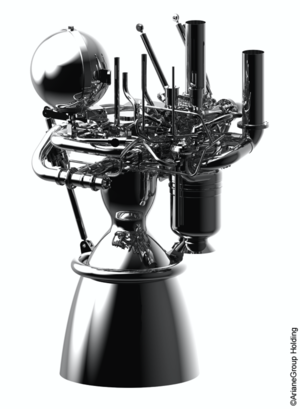How ESA helps launch bright ideas and new careers
Hundreds of innovative companies—many with little or no direct connections to the space industry—have prospered from forming partnerships with the European Space Agency.
ESA’s Business Applications and Space Solutions programme co-funds projects and start-ups while offering technical and business support to companies that seek to deliver rapid innovation and raise private investment. Overall ESA spends €400 million a year on strengthening the competitiveness of European and Canadian companies in the global markets not only for satellite communications but also for downstream applications.
One recent success is Mynaric, a German company that is making laser communication equipment for airplanes, high-altitude platforms and, eventually, satellites. The company, which was founded as a spin-off from the German Aerospace Centre (DLR) in 2009 and supported by the ESA Business Incubation Centre in Bavaria, uses lasers to send data securely, wirelessly and at rapid rates over long distances.
Ultimately it seeks to help companies build fully-meshed airborne broadband systems to transform in-flight connectivity. The company floated on the Frankfurt stock exchange in October 2017 and raised €27million in investment. It now employs more than 100 people.
“The real boon we received from ESA was its business support,” said Markus Knapek, a co-founder of Mynaric. “We used ESA’s Business Incubation Centre for two years from 2010. It was a real help in increasing our presence and visibility.
"We were able to avail ourselves of business consultancy services, which helped in establishing the business, and the general start-up atmosphere helped in establishing contacts. Importantly, the ability to rent offices close to the DLR at Oberpfaffenhofen, kept us close to the organization out of which we grew. From there on in, we were able to grow to the 100-strong company we are today.”
Another company to prosper from its partnership with ESA is Lilium, which hopes to develop an electric jet that can seat up to five people. The design employs a vertical take-off and landing system combined with fixed wings for high-speed travel.
Although the invention remains many years from becoming commercially available, Lilium has raised more than €100million in investments from private partners since it was launched in 2015 at the ESA Business Incubation Centre in Bavaria. The company has grown to employ some 200 people.
Meanwhile engineers at Open Cosmos, founded in 2015 and now hosted at the ESA Business Incubation Centre in Harwell, UK, have raised €7 million in private funding to build and launch small, inexpensive satellites.
Traditional satellites take several years to plan, build and launch and cost tens or hundreds of millions of euros, but Open Cosmos is offering to do the job within a year and at prices from €600 000.
The company, which employs just under 50 people, launched its first nanosatellite in April 2017.
“ESA has demonstrated a strong track record in supporting innovation and industrial competitiveness. The vision of ESA Business Applications and Space Solutions is to improve the lives of people on Earth through space. We make this possible by enabling and supporting businesses through the commercialisation and application of space technology for everyday services,” said Nick Appleyard, Head of ESA’s Business Applications department.
Space has become an integrated part of our daily lives. From smartphones to agricultural monitoring, the socio-economic benefits of space activities are so diverse that they are not always so obvious to the general public. ESA focuses this week on what space is doing for the economy, in particular, highlighting the flourishing applications domain and business opportunities.















 Germany
Germany
 Austria
Austria
 Belgium
Belgium
 Denmark
Denmark
 Spain
Spain
 Estonia
Estonia
 Finland
Finland
 France
France
 Greece
Greece
 Hungary
Hungary
 Ireland
Ireland
 Italy
Italy
 Luxembourg
Luxembourg
 Norway
Norway
 The Netherlands
The Netherlands
 Poland
Poland
 Portugal
Portugal
 Czechia
Czechia
 Romania
Romania
 United Kingdom
United Kingdom
 Slovenia
Slovenia
 Sweden
Sweden
 Switzerland
Switzerland



























